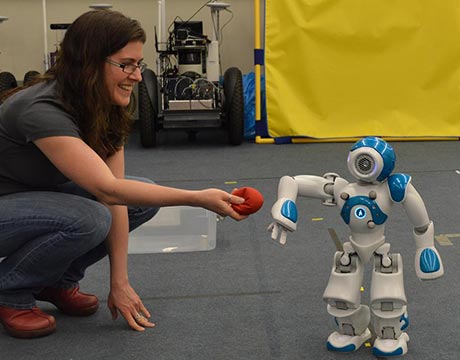Charter Day panelist preview: roboticist Hadas Kress-Gazit
By Sue Brightly
Register for Charter Day Weekend events
Charter Day: A Festival of Ideas and Imagination, part of Cornell’s sesquicentennial celebration, runs April 24-27. For event details and registration visit 150.cornell.edu/charterday.
Robotics expert Hadas Kress-Gazit, assistant professor of mechanical and aerospace engineering, will speak at Charter Day: A Festival of Ideas and Imagination. Her panel, “Robotics: Today's Intertwining of Engineering and Computer Science,” will be Sunday, April 26, 9-10:30 a.m. in Schwartz Auditorium, Rockefeller Hall.
Tell me about your presentation – why should someone come see it?

The panel is on robotics at Cornell: past, present and future. I think people are interested in robotics in general – robots capture the imagination. But things are very different in actual robotics than they’re portrayed in film, or TV or fictional media. In the movie “Blade Runner” you couldn't tell the difference between an android and a person. We’re nowhere close to that. We’re getting much better, but there are questions of sensing, decision-making and actuation: How do you move in a correct way? How do you make robots easier to interact with?
What is your area of robotics research?
I’m interested in high-level verifiable robotics; how you interact with robots at a high level using language, and how you provide guarantees for their behaviors. Say you want a robot to go to the cafeteria from here. If I don’t control the door, then the robot might not be able to get there, because the door is closed. If you tell the robot, now the door is open, then the robot should say, “Yeah, sure!” and just go and do what it needs to do. It’s basically making sure that a robot can actually do what you ask it to do. So that even if you give a robot a totally impossible specification, it will be able to tell you, “That’s impossible and this is why.”
What sorts of things are you working on that will impact everyday people?
Robotics has really changed in the last couple decades. Things are moving away from factories, from the repetitive, you-program-it-once-and-it-does-the-same-thing-forever robots, into robots that are interacting with humans in complex environments. And you need to worry about interaction, you need to worry about the physicality of these robots – how they look, how they move, how safe they are.
What has been your favorite robotic project?
I don’t have a favorite. I’m excited about all my projects. I’m excited about the ability to connect at a high level, to use natural language to talk to a robot, and then have the robot actually do what it’s supposed to do, because, traditionally, that is not an easy thing to do. It’s something that I think would be very impactful in the world.
What would be the coolest thing you’d like to have a robot do in your personal life?
Definitely chores. Things that take away time I have for my family. Tidying things up, putting things in place. That is difficult for a robot to do – it’s so open-ended and requires so much physical dexterity. To go upstairs, fold things, put them away, file all the pieces of paper and put it all in order.
Could we have a robot do that in the next 50 years?
There would need to be a lot of advances. Think about a toddler – can a toddler do that? A toddler can go and get a brush and brush things off the floor, but he picks it up and spills half of it. I can’t tell a toddler to go set the table – they don’t have the dexterity, they don’t have the sequencing of it. In robotics, we’re at the toddler age right now. There have been a lot of really exciting advances in AI [artificial intelligence], in terms of image processing, in terms of speech processing; but they’re not physical. It requires way more than decision-making. It requires the actuation, the mechanics.
Thinking about robots portrayed in films like “The Terminator” and others, is there a reason to be afraid of robots?
I think the fear of self-aware killer robots is exaggerated. It’s not based on fact. And fear is never a good motivator for progress. A more concrete fear is what people will do to other people using AI. I think the same thing applies to robotics. My fear is not that robots will kill us, my fear is that people will use robots to kill other people. But it’s not the super intelligence that’s going to wipe us out.
Do you have a favorite robot from film or TV?
Wall-E is definitely my favorite robot – I even have one in my office.
Media Contact
Get Cornell news delivered right to your inbox.
Subscribe